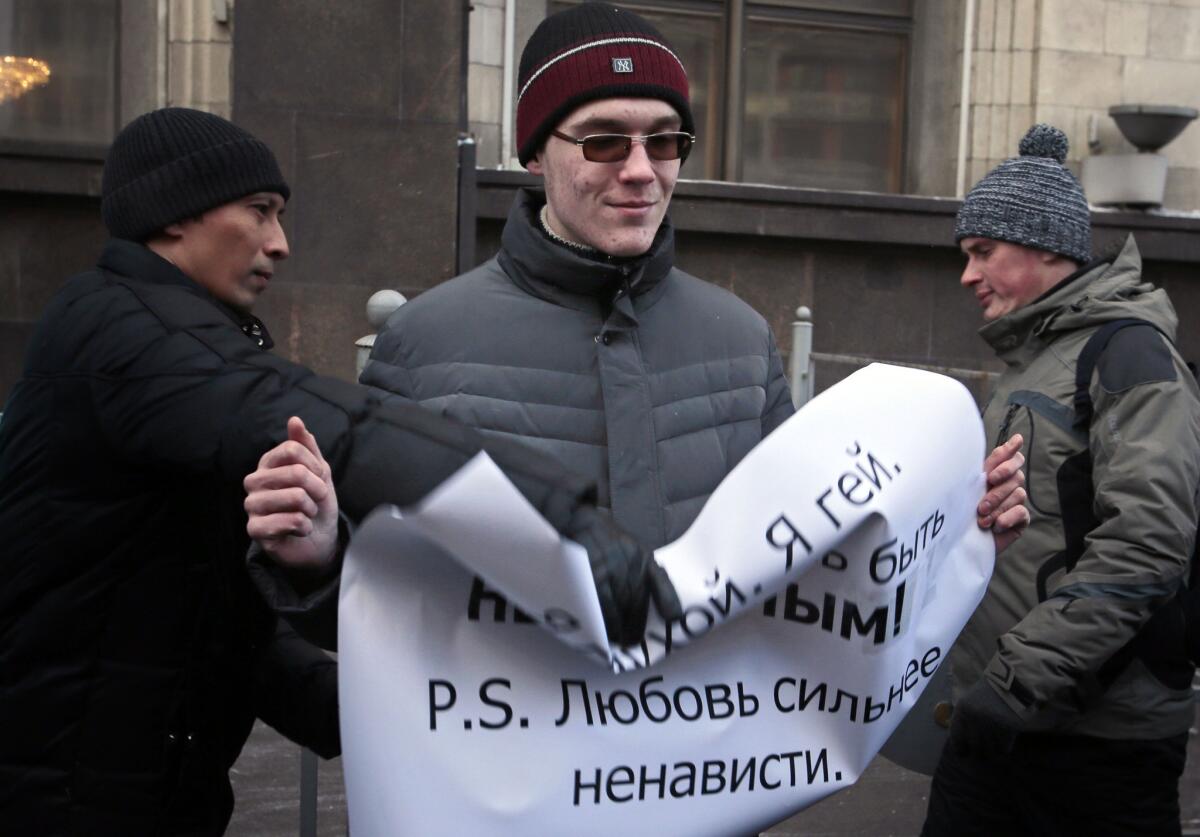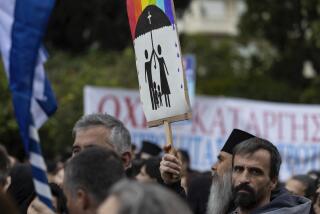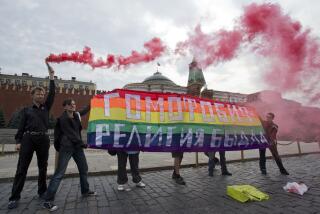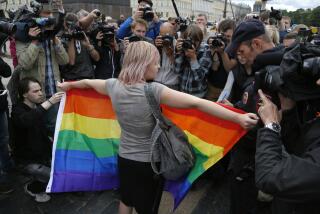Russian lawmakers give initial OK to gay ‘propaganda’ bill

MOSCOW — The lower house of Russia’s parliament on Friday approved in the first reading a controversial measure against the spread among minors of “propaganda” seen as supporting homosexuality.
But the lawmakers put off until the next reading a central question: What constitutes “propaganda”?
The first hearing of the bill was preceded by two days of sporadic clashes over the issue between gay activists and religious Orthodox radicals in front of the State Duma, the lower house. Police intervened Friday morning, detaining about 20 people from both sides when the conflict deteriorated to fistfights.
The bill’s sponsors proposed imposing heavy fines for propaganda, ranging from $165 for individuals to $16,500 for organizations.
Limiting “such propaganda as the targeted and uncontrolled spreading of information capable of doing harm to health and moral and spiritual development, including forming a distorted notion of the equality of traditional and nontraditional sexual relationships, among persons due to their age unable to critically evaluate such information, can’t be perceived as violating the constitutional rights of citizens,” lawmaker Sergei Dorofeyev said in response to complaints that the measure would infringe on the rights of the gay community.
An issue facing lawmakers Friday was defining what constitutes propaganda, a task they will tackle before the second of three readings, expected this spring.
The nationalist Liberal Democratic Party faction refused to take part in the vote, arguing that discussion, passage and enforcement of the law would serve only to bring further attention to homosexuality.
Voting on the bill “is in itself a form of [such] propaganda,” said party leader Vladimir Zhirinovsky. “When they are fined every day, we will hear ‘homosexuality, homosexuality.’ It is a provocation ... [our party] will not take part in.”
But gay activists said such a law would turn gays and lesbians into second-class citizens and leave Russia lagging behind more progressive nations in its policies.
“This law insults me as a gay person, and my same-sex family too,” Yelena Kostyuchenko, an activist and reporter with Novaya Gazeta, said in an interview. “I won’t be able to talk freely on the topic and I won’t be able to write on the topic either without exposing my paper to ridiculously huge fines.
“The law reduces me and millions of gays in Russia to the hidden life of speechless beings deprived of a right to even publicly hold hands or kiss each other.”
Kostyuchenko said that given the absence of a figure like Harvey Milk, the San Francisco supervisor and gay activist who was slain in 1978, Russia’s gay community is not yet strong enough to stand up for its interests in the face of threats.
Recent polls conducted by the independent Levada polling agency indicate that about 80% of respondents were against officially sanctioned same-sex marriages and public gay pride parades.
However, about 57% of the respondents said they were against legal prosecution of homosexuals and only 22% spoke firmly in favor of such measure.
The bill will become law but it will be very difficult to enforce, said Lev Ponomaryov, head of the For Human Rights Movement, a Moscow-based rights group, who sees the measure in context of moves by the Putin administration against the political opposition.
“The Kremlin in its ill-conceived desire to crack down on the opposition on all fronts, including such a sensitive sphere as sexual orientation, more and more slides down to repression, its agenda purely ideological and having nothing to do with the economy or running the country in a proper way,” Ponomaryov said in an interview.
“They think that by passing one repressive law after another they are solidifying their hold on power,” he said, “but in fact they are destroying it with such irrational convulsions like this law against homosexuals.”
ALSO:
Afghan bomber targets NATO convoy, kills 5 civilians
Afghanistan’s new generation: Modern, ambitious ... naive?
Protesters slam Egypt government two years after revolution
More to Read
Sign up for Essential California
The most important California stories and recommendations in your inbox every morning.
You may occasionally receive promotional content from the Los Angeles Times.










